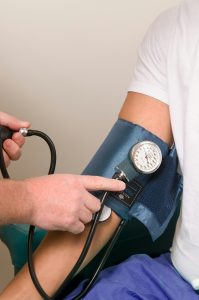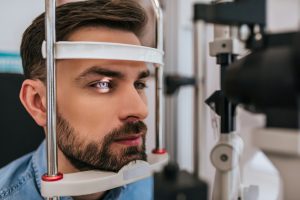Routine health checks are essential for maintaining good health and catching any potential issues early on. For men, here are some important health checks to consider:
1. Blood Pressure Screening

High blood pressure often has no symptoms but can lead to serious health problems like heart disease, stroke, and kidney disease.
According to the Australian Institute of Health and Welfare (AIHW) men typically have higher blood pressure and develop cardiovascular diseases earlier than women. The sexual dimorphism in blood pressure begins at puberty and persists through adult age.
Regular blood pressure checks are therefore crucial, especially for men as they age.
2. Cholesterol and Blood Glucose Levels
High cholesterol levels increase the risk of heart disease and stroke. Regular screening helps monitor cholesterol levels and allows for interventions if levels are too high.
High blood sugar levels can lead to various health complications if left untreated. Screening for diabetes or pre-diabetes is important, particularly for men with a family history of diabetes or those who are overweight.
3. Prostate Health

Starting at age 50, men should discuss with their healthcare provider whether they need prostate cancer screening, including a prostate-specific antigen (PSA) blood test and/or a digital rectal exam (DRE). For those with a family history of prostate cancer or other risk factors, screening may begin earlier.
Around 25 per cent of men aged 55 years and over have a prostate condition. This increases to 50 per cent by the age of 70 years. Early stages of prostate disease may have no symptoms so it is important to carry out routine health checks as advised by your general practitioner.
If you are a man and you are in your 50s or 60s, talk to your doctor about whether you need to have your prostate gland checked and, if so, how often. If you have a family history of prostate disease (or if you have particular concerns), talk to your doctor earlier about when prostate checks might be suitable for you.
4. Testicular Self-Examination
Regular self-examination of the testicles can help detect lumps or abnormalities that may indicate testicular cancer. Men should be familiar with the normal size, shape, and feel of their testicles and report any changes to their healthcare provider.
According to Better Health Victoria, around 200 Victorian men are diagnosed with testicular cancer every year, most commonly between the age of 20 and 50. This rare cancer has a high cure rate and is more easily treated in its earlier stages. They recommend that if you recognise changes in your testicles, see a doctor as soon as possible. It is a good idea to perform a self-examination even if you have had testicular cancer or are currently being treated for it, because cancer may develop in the other testicle.
5. Colorectal Cancer Screening
Beginning at age 50, men should undergo regular screening for colorectal cancer, which may include colonoscopy, faecal occult blood test (FOBT), or sigmoidoscopy.
Individuals with a family history of colorectal cancer or certain risk factors may need to start screening earlier.
6. Skin Examinations
Regular skin checks can help detect skin cancer early. Given Australia has one of the highest rates of skin cancer in the world this routine examination should be at the top of anyone’s list for health screenings. About 2 out of 3 Australians will be diagnosed with some form of skin cancer before the age of 70. Non-melanoma (keratinocyte) skin cancer is the most common cancer diagnosed in Australia.
Men, particularly in Australia, should examine their skin regularly for any new moles or changes in existing moles and report any concerns to their healthcare provider.
7. Dental Check-ups
Regular dental examinations and cleanings are important for oral health and can help prevent gum disease, tooth decay, and other dental problems. Like other major health factors, sex and gender related health disparities in oral health remain an under-appreciated and often overlooked aspect of well-being.
A 2021 study found that “. They experience higher rates of periodontal disease, oral cancer and dental trauma resulting from a combination of biologic, social and gender related factors.”
Men need to make a concerted effort to integrate dental check ups into their annual and bi-annual screening roster.
8. Eye Examinations

Regular eye exams can help detect vision problems, glaucoma, and other eye conditions early, allowing for prompt treatment and prevention of vision loss.
In Australia, eye tests can typically be carried for free at bulk billed clinics or optometrists and treatment of eye conditions and/or the purchase of prescription glasses will typically be covered under Medicare or private medical insurance.
9. Mental Health Screening
Mental health is just as important as physical health. Men should be aware of their mental well-being and seek help if experiencing symptoms of depression, anxiety, or other mental health concerns.
Better Health Victoria reports that “on average, one in 8 men will have depression and one in 5 men will experience anxiety at some stage of their lives”. While men are apparently less likely to experience anxiety and depression than women, they are also less likely to talk about it. This increases the risk of their anxiety or depression going unrecognised and untreated which is a high risk factor for suicide.
Consequently, there are about 3,000 suicides each year in Australia and approximately 75% of those who take their lives are men. It’s important to remember that anxiety and depression are conditions, not weaknesses, and effective treatments are available.
Prioritise mental health by managing stress, seeking support when needed, and practising self-care activities. Mental health is just as important as physical health, so it’s essential to address any concerns and seek help if necessary.
Conclusion
It’s important to note that individual health needs may vary, and men should discuss their specific health risks and screening recommendations with their healthcare provider.
Additionally, maintaining a healthy lifestyle through regular exercise, a balanced diet, adequate sleep, and stress management can contribute to overall well-being and reduce the risk of many health problems.
For those looking to take proactive steps in managing their health, Healthscreen offers comprehensive screening services that adapt to your personal health requirements. Make your health a priority today—schedule a consultation with Healthscreen to ensure you are on the best path to long-term wellness.



